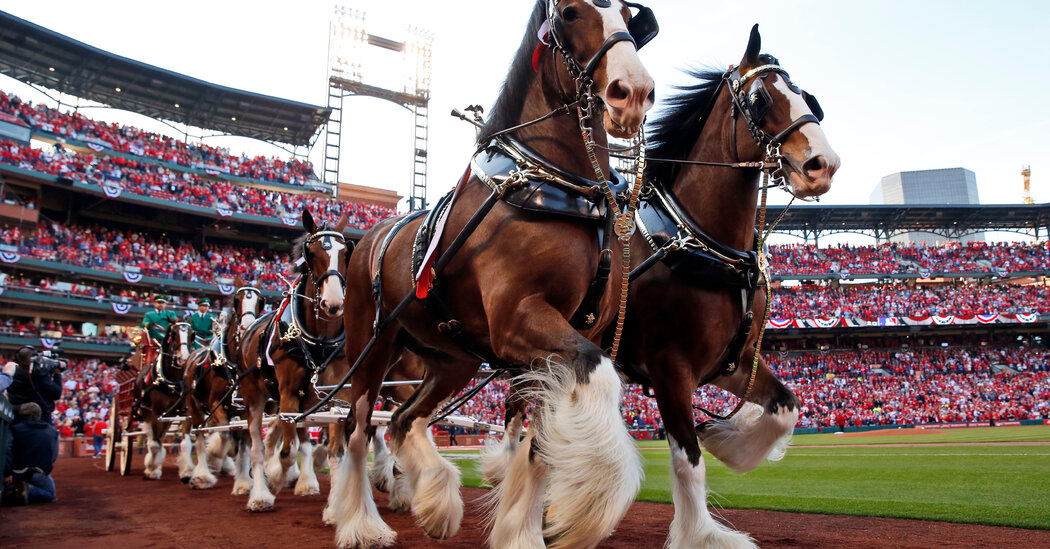Facing pressure from animal rights activists, Anheuser-Busch announced on Wednesday that it had ended the practice of amputating the tails of its Budweiser Clydesdales, the familiar equine figures in the brewing company’s advertising campaigns for nearly a century.
The move came as Anheuser-Busch, Budweiser’s parent company, has faced criticism for the practice, which is banned in several countries and has been denounced as inhumane by animal welfare organizations.
“The safety and well-being of our beloved Clydesdales is our top priority,” an Anheuser-Busch spokeswoman said in a statement on Wednesday. “The practice of equine tail docking was discontinued earlier this year.”
Earlier this year, Anheuser-Busch drew criticism after the release of an investigation by People for the Ethical Treatment of Animals, or PETA, that documented the amputations at breeding and training facilities for the Budweiser Clydesdales in Missouri.
Known as tail docking, the practice is commonly performed on draft horses, such as the Clydesdale, to “prevent the tail of the horse from interfering with harness and carriage equipment,” according to the American Veterinary Medical Association.
According to the association, the amputation removes a portion of the bony part of a horse’s tail.
A representative for Anheuser-Busch did not say why the company had performed the procedure on its horses.
PETA publicized its investigation in an advertisement campaign in February, around the time of the Super Bowl, when the Budweiser Clydesdales appear on millions of screens across the country in TV commercials.
The PETA campaign included billboards and the release of a mock Super Bowl commercial.
Beyond the physical pain inflicted on the horse during the procedure, tail docking restricts a horse’s ability to protect itself from insects and to communicate with other horses, the American Veterinary Medical Association said.
That is why several states in the U.S. and countries in Europe, including Belgium and Germany, have banned the procedure, according to the organization. Budweiser began using the horses in its marketing beginning in 1933, according to Anheuser-Busch.
Two six-horse Clydesdale hitches hauling beer wagons appeared in a New York City ceremony that year to mark the end of prohibition, according to the company’s website, and subsequently toured the Northeast.
Today, a team of 10 Clydesdale horses haul Budweiser beer wagons, which appear at marketing events across the country.
The horses, along with their Dalmatian companions, have been a Super Bowl commercial staple since 1975, according to Anheuser-Busch. In the 1980s, the company began airing Christmas-themed commercials featuring them.
The company’s discontinuation of tail docking cleared the way for it to receive certification by American Humane, the national animal welfare organization. That certification was announced on Wednesday.
Kathy Guillermo, a vice president at PETA, said the organization’s staff members were “cracking open some cold ones today” to celebrate the news, adding that the decision “sends a message to other companies that animal abuse doesn’t sell.” Rob Franklin, the president of the American Association of Equine Practitioners, a leading horse veterinary group, praised the news on Wednesday, saying that the organization was “hopeful that this action will help lead to a new era of draft horse welfare and safety.”



Why would this be something that needs banning? Why the fuck would they be cutting off the tails of these animals?
From a quick Google search, docking is done to prevent injury to the stallion in mating and is thought to increase the frequency/ desire for the stallion to mate. There are, of course, more humane ways of accomplishing this but that’s the historical justification for the practice
This is the kind of irrational bullshit that people defend to the death. “Thought to” = wishful thinking with zero evidence. Thanks for looking it up, though!
It mentions why in the text above…
It’s in the text.
PETA tries not to be either bitchy or grandiloquent challenge